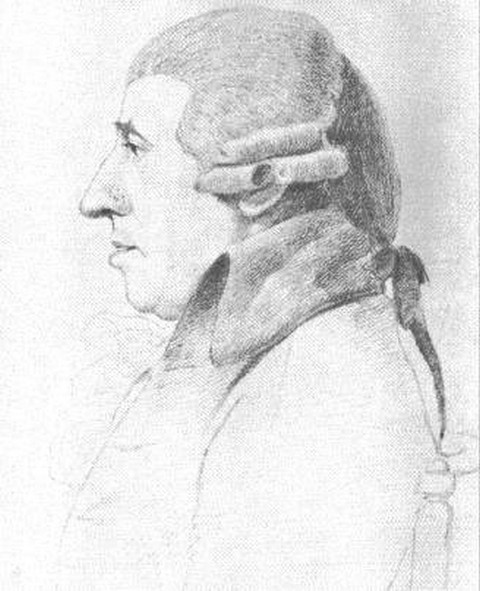A CROATIAN COMPOSER
NOTES TOWARD THE STUDY
OF
JOSEPH HAYDN
First edition in 1897, London
(Seely and co. limited),
reprinted in 1972, New York (Books for Libraries
Press, Freeport, New York)

Joseph Haydn (1732-1809). Pencil sketch by
George Dance, 1794.
Source of the photo Classical Music Pages.
...if we accept the historical statement as true, we do something to rescue a musical nation from undeserved neglect. The race which has given to a master not only birth but inspiration may surely claim from us someting better than oblivion into which we have allowed its name to fall.[from Hadow's PREFACE, Oxford, 1897]
EXCERPTS from the book:
- Introduction (pp. 1-40)
- Examples of Croatian folk songs in Haydn's oeuvre (pp. 40-65)
- German National Anthem and its relation to a Croatian folk song (pp. 65-72)
- Conclusion and Appendices (pp. 72-98)
Subsection titles given by Darko Zubrinic. Hadow's original text goes in continuo.
Acknowledgment: I express my deepest gratitude to Adam Eterovic, USA, for having sent me a copy of Hadow's book, and also to Frank Kurt Cylke, National Library Service for the Blind and Physically Handicapped, The Library of Congress, Washington, USA, for the missing page 48.
On this web since February 1999.
The book is available online:
https://archive.org/details/croatiancomposer00hadouoft
Moreover, the book can be retreived from the same addres in [PDF] and other formats.
Many thanks to the University of Toronto, which contributed the book.
Related references:
- Frano Kuhac: Josip Haydn i hrvatske narodne popijevke, Vienac, Zagreb, 25. ozujka 1880. (Joseph Haydn and the Croatian Folk-songs, Agram, 1880);
- Academician Lovro Zupanovic
- Andjelko Nedo Paveskovic (Monte Carlo):
Skladatelj Josip Haiden (Haydn) Hrvat ili Nijemac?
(Was Josip Haiden Croatian or German?), Poljica, Gata, 2001, broj 26,
pp. 61-107;
- word files (in Croatian): 61-62.doc, 63-67.doc, 68-79.doc, 80-89.doc, 90-99.doc, 100-107.doc (here with kind permission of Rev. Frane Mihanovic, editor in chief of Poljica)
- several interesting items from this long paper:
- Until 1954, the well known Grove's Dictionary of Music and Musicians, London, accepted the opinion of Haiden (Haydn) as the Croat (and since that year accepted the opinion of Schmid about his alledged German roots)
- Dutch historian of art Henrik van Loon (in 1937) and Canadian historian Murray Gibbon (in 1938) pointed out to the political motivations in these questions, and that it should not be alowed to "Teutons" to deny Croatian roots of Haiden.
- Croatian newspaperman Salih Zvizdic wrote the following article in 1958: Da li je Haydn bio Hrvat? (Was Haydn of Croatian descent?), Večernji vjesnik, 10. travnja 1958. The author described his visit to Haydn's Museum in Željezno (Eisenstadt), in which the lady who received Mr Zvizdic (Mrs Rosel) refused to take money from him, since he came from Croatia. Hundred and more years before the article was written, a descdendant of the Haydn family and proprietor of the house which he donated to the local county, and which was to become Haydn's Museum, wrote in his testament that "the the tickets should not be charged to any Croatian". Salih Zvizdic mentioned that the Gradisce (Burgenland) Croats are convinced that Haydn was of Croatian descent, that he spoke Croatian, and that he was travelling throughout Gradisce, speaking with his compatriots and noting Croatian melodies, which he used in his compositions. Zvizdic mentioned that several houses in Burgenland (Gradisce) bear inscriptions in Croatian language, informing that Haydn (Hajdin), a famous Croatian composer, payed a visit to them (... u njima je boravio Josip Hajdin, slavni hrvatski glazbenik). Furthermore, Zvizdic mentioned a letter sent to Haydn by Croatian count (grof) Janko Drašković in 1906, in which he called him to be Croatian. Burgenland (Gradisce) Croats, concluded Zvizdić, consider it to be a big injustice that Haydn's Croatian roots are no more mentioned. Many thanks to Professor Vladimir Cepulic, Zagreb, for this information (2015). For more details, please, see the photos of Zvizdic's article: [JPG1], [JPG2], [JPG3], [JPG4].
- Larousse Musique in 1957 considers the Slavic -
Croatian roots of Haydn possible.
- Sir Kenneth Clark, in his TV presentation The Civilisation (famous for his book having the same title), shown by Swiss - Italian TV in 1970s, claims Haiden to be the Croat
- Anthony Hodgson in his book The Music of Joseph Haydn (London, 1976) considers Hayden to be the Croat born in Trstenik (Rohrau), and stresses notable presence of Croatian folk melodies in Heidens's famous symphonies
- [Remark by D.Z.: Let us mention a very nice and
lively presentation of Haydn's person and music by Leonard Bernstein,
USA, in his TV show, where Bernstein was obviously citing long passages
from Hadow's book (stressing among others "non-Teutonic" character of
Haydn's music and his personal appearance), without mentioning either
the name of the author of the book, or its significant title, which we recall again:
A Croatian Composer;
Notes towards the study of Joseph Haydn] - Hayden included in his music about 30 Croatian folk melodies!
- Haydn's melody Gott erhalte (German National Anthem) is evidenced from Croatian Littoral and environs of Zagreb to Medjimurje on the North, and to Gradisce (Burgenland) in Austria
- El compositor Jose Haiden (Haydn, 1732-1809) y los Croatas (Con motivo de 190 anos de la muerte del compositor)
- El compositor Jose Haiden (Haydn, 1732-1809) y los Croatas (La presencia croata en Gradisce)
- Franz Joseph Haydn, based on the Encyclopaedia Britannica from 1911
- Sir William H. Hadow, Croatian Composer, Hrvatski Skladatelj, Josip Haiden, (Croatian - English edition), Naklada E. Cic, Zagreb, 2005, 160 pp, ISBN 953-98968-3-5
- Jožef Haydn i hrvatske narodne jacke, Zajednica hrvatskih komunalnih politicarov u Gradiscu, Austria, 2009. [PDF]
Different opinions:
- Der kroatische Haydn
- Gerald Schwertberger: Zur Herkunft des Haydn'shcen Kaiserliedes [PDF], 2009
Back to Croatian music